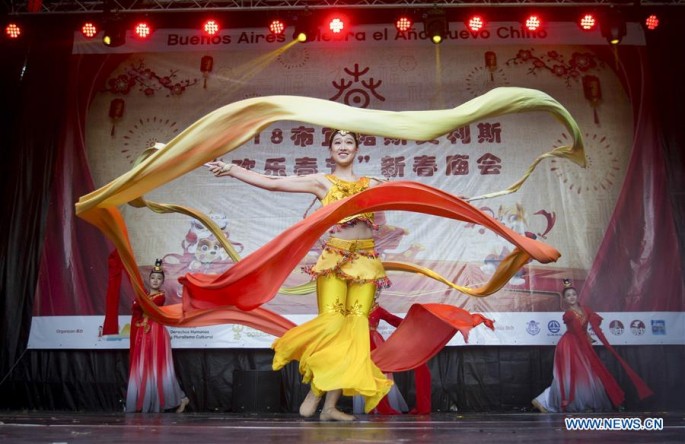
Artists from Hangzhou perform during the celebration of the Chinese Lunar New Year, in Buenos Aires, Argentina on Feb. 10, 2018. Argentinean citizens and Chinese residents in Buenos Aires gathered on Saturday in the Parques Nacionales Square to celebrate the Spring Festival and enjoy a show of traditional dance, music and acrobatics to welcome the Chinese New Year.
As the Chinese New Year is getting closer, the world is getting into the mood of the Spring Festival celebration.
Cultural events like music and dance performances, photo exhibitions, art shows are being organized across the globe, with many countries about to embrace a huge influx of Chinese tourists during the week-long holiday.
Analysts said the Spring Festival is becoming a "world gala" with more and more people getting to know China better through this timeless tradition while financially benefitting from the festival economy.
CULTURAL FEASTING
The Spring Festival, or the Lunar New Year, is regarded as the most important traditional festival for anyone of Chinese origin, with "key signature events" such as family reunions, feasts and performances.
The year 2018 will be the Year of Dog, which will officially begin on Feb. 16, according to the Chinese lunar calendar.
The Spring Festival is chockful with Chinese wisdom, said Guan Zhaoyu, associate research fellow with Chongyang Institute for Financial Studies, Renmin University of China.
Guan told Xinhua that with the Spring Festival gaining a rising global influence, it provides everyone with a good opportunity to understand true Chinese culture.
According to the latest release of China's State Council Information Office, the Chinese New Year will be celebrated in more than 400 cities across more than 130 countries and regions this year.
Myanmar's Yangon organized a Chinese gourmet festival to introduce traditional Chinese cuisine to the people of Myanmar.
The gourmet festival aims not only to exchange food-cultures between the two countries, but also to promote ASEAN-China relations, said Sun Jianhua, deputy director of Education, Culture and Tourism division of ASEAN-China Center.
While on the European continent, a gala showcasing singing and dancing was held in the western German town of Hanau. The performances also featured the traditional Chinese opera, Chinese Kung Fu and a cheongsam fashion show, the traditional one-piece Chinese dress for ladies.
"We could expect (a) deepened friendship between (the) Chinese and (the) German(s)" with the performance brought by young people from both China and Hanau together, said Juergen Scheuermann, Chairman of Hanau Taizhou Friendship Association.
Moreover, the various customs of the Spring Festival is a collective demonstration of the Chinese spirit of inner peace, unity, and respect for traditions and ancestors, according to Guan.
"Through the Spring Festival, the world can get to know China about its diversified cultures and understand a more realistic China," said Guan.
"I hope that the Spring Festival can become a shared topic of China and the world to communicate with each other," he added.
RED ENVELOPE FROM CHINA
In tandem with the festivities, traveling abroad has now become a new trend for the Chinese who wish to spend their extended Spring Festival holiday.
A total of 6.5 million Chinese will travel abroad during the upcoming week-long holiday, said a report released by China Tourism Academy and Ctrip.
People from more than 200 Chinese cities have reserved outbound tours to over 700 cities in 68 countries and regions on Ctrip, a popular online travel agency based in Shanghai.
The most popular destinations are Thailand, Japan, Singapore and Vietnam. The Nordic countries and the United Arab Emirates are also among the favorites. Some of the travelers will be going as far as the Antarctica.
Tourists are expected to spend 9,500 yuan (1,510 U.S. dollars) each on their trips. And thanks to the mobile payment services provided by Chinese APP of Wechat and Alipay, Chinese travelers don't need to exchange foreign currency, which will largely facilitate the consumers' shopping experience.
To accomodate the Chinese tourists, world-renowned landmarks will be lighted up to earmark the Spring Festival.
The top of the Empire State Building in Midtown Manhattan, New York, will be emblazoned in red and gold at dusk on Tuesday and Thursday. While the Effiel Tower in Paris will feature a joint light-show between the Chinese and French cities on the eve of the Lunar New Year.
During the Spring Festival, the large-scale flow of people, cash and information have created the unique "Spring Festival economy," according to Guan.
He said in recent years, that the top tourist destinations for Chinese people have inadvertently become beneficiaries of the Spring Festival "red envelope," referring to the "financial benefits" from this consumption trend. ' "As the Lunar New Year is becoming a global festival, I believe the concept will bring more and more economic and trade benefits to the whole world," he added.


























